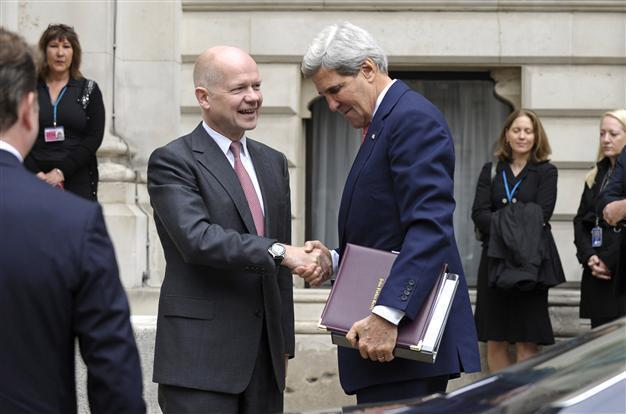Kerry says Syria needs political solution - but after strikes
LONDON - Agence France-Presse

British Foreign Secretary William Hague (Centre L) greets US Secretary of State John Kerry (Centre R) outside the Foreign Office in London, on September 9, 2013. AFP photo
US Secretary of State John Kerry said Monday that the solution to the Syrian conflict must be political not military as Washington began a crucial week in its bid to persuade a sceptical public and Congress of the need for strikes.
Kerry made an impassioned defence of President Barack Obama's push for action against the Assad regime, saying that this was not the time for the world to fall "silent" and action was essential to stop innocent people from being gassed.
He made his plea in London before flying back to Washington to help Obama push his case for support from Congress and attempt to reverse his nation's mood.
In response to a series of TV interviews that Obama is due to give, Syrian President Bashar al-Assad made his own case in a US television interview, saying Washington should "expect everything" if it attacked his country.
After talks with British Foreign Secretary William Hague in London, Kerry said the US fully agreed that the solution to the conflict would come not from the battlefield, but from negotiations -- but the key was getting all the parties to talks.
"Let me be clear, the United States, President Obama, myself, others are in full agreement that the end of the conflict in Syria requires a political solution. There is no military solution, we have no illusions about that," Kerry said.
"A resolution will not be found on the battlefield, but at that negotiating table. But we have to get to that table." The international community could not stand by and allow Assad to gas his own people, he said.
Citing the Holocaust and the Rwandan genocide, Kerry said "we need to hear an appropriate outcry as we think back on those moments of history when large numbers of people have been killed because the world was silent".
Washington was convinced that the chemical weapons in Syria were controlled by "a very tight network" with the president at its centre, he said.
"It is Bashar al-Assad, Maher Assad, his brother, and a general who are the three people who have control over the movement and use of chemical weapons," Kerry said.
"We have no issue here about the question here of responsibility. There is none." Asked what Assad could do to prevent a military attack, Kerry said he could turn over his chemical weapons to the international community.
"Turn it over, all of it, without delay and allow a full and total accounting for that," Kerry told reporters. "But he isn't about to do it and it can't be done." Hague insisted that Britain and the United States were "closely aligned" despite Britain -- normally Washington's staunchest ally in military action -- not taking part in the strikes after parliament rejected action last month.
Syria's ally Russia meanwhile warned that military strikes risked causing an "outburst of terrorism" in the region at a time when the Damascus regime is still prepared to take part in talks to end the conflict.
'Expect everything'Assad, fighting a propaganda war as Washington agonises over whether to attack, gave an interview to veteran CBS and PBS newsman Charlie Rose, in which he warned Washington to brace for the fallout of an attack against his war-torn country.
"You should expect everything... The government's not the only player in this region. You have different parties, different factions, different ideologies. You have everything in this decision now," Assad told CBS.
Obama, criticised in the past for being too slow to get tough with Congress, dropped into a dinner hosted by Vice President Joe Biden for wavering Republican senators at his official residence in Washington late Sunday.
On Tuesday, the president will address Americans from the White House, ahead of a possible Senate vote on authorising force in Syria later this week.
While the White House believes an endorsement from the Senate could be within reach, Obama faces a wall of opposition from both Republicans and from many of his Democratic allies in the House of Representatives.
In Moscow, Russian Foreign Minister Sergei Lavrov warned after talks with his Syrian counterpart that "a military solution will lead to an outburst of terrorism both in Syria and in neighbouring countries".
